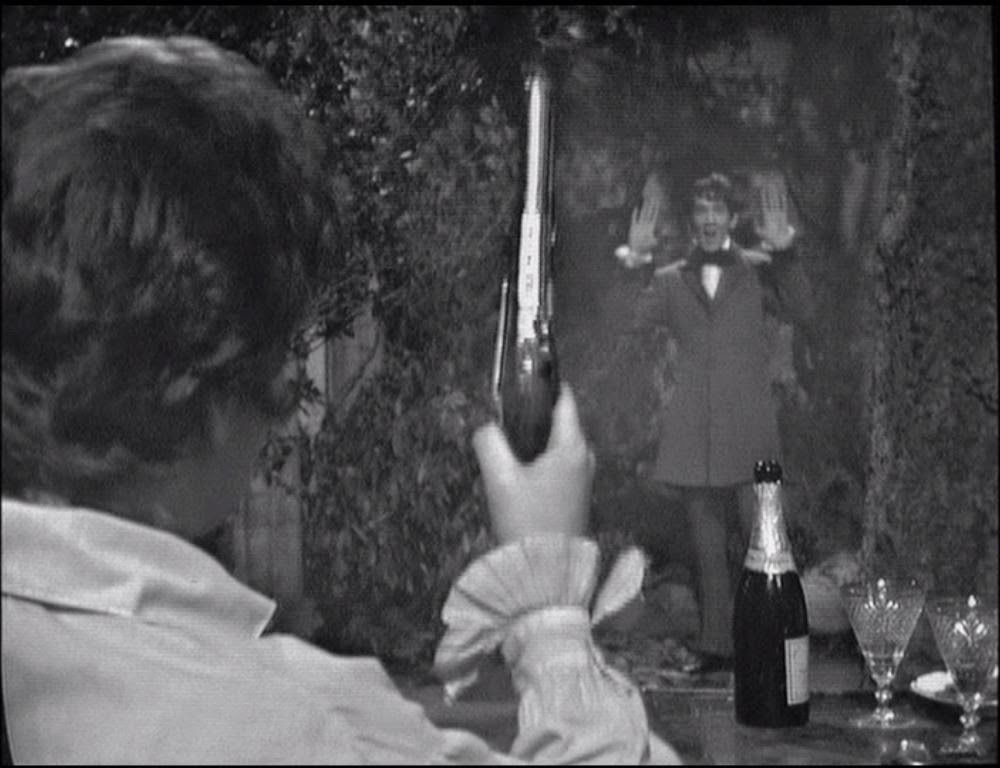Time for another furious canter through Alexandre Dumas' tale of remorseless vengeance, with de Villefort and Mme Danglars desperately trying to conceal their shock at the Count of Monte Cristo's nonchalant claim to have discovered a child's remains in his garden at Auteuil. He fares rather better than she does, but, as Eugenie and Maximilian perform to lighten the mood, gets her alone just long enough to arrange a meeting at his office the following day.
The Count takes a stroll in the garden with Baron Danglars, who laughs off the notion that his bank's in trouble. However, he shows a great deal of interest in the newly arrived Cavalcantis, especially their financial situation. It's clear that he's considering the young man who calls himself Andrea Cavalcanti as a more lucrative fiancé for Eugenie than Albert de Morcerf.
Talk of Albert leads to talk of his father, who the Count says he's heard of in relation to the late Ali Pasha. Danglars claims to be a great friend of General de Morcerf, but is clearly wetting himself at the prospect of exposing the scandal the Count intimates is attached to him. The performances here are, of course, a treat, with Morris Perry's Danglars clearly considering himself a master manipulator, and Alan Badel's Count showing only the tiniest traces of his amusement at this self-important fly being caught so readily in his web. As in the book, the Count's plans only gradually become clear, and here we realise with horrid fascination that he's engineering the unwitting (and wholly innocent) Eugenie's marriage to her own brother.
It seems that at least one person has begun to catch on to the Count's game: jolly Albert de Morcerf, who's fascinated with the way the Count's established himself as a centre of attraction: "I see you as a kind of a grand puppet master: you pull the strings, we dance!" Soon he won't be taking it all so lightly.
De Villefort and Mme Danglars meet to discuss the Count's announcement of the previous night. She's desperately clinging to the hope it's all coincidence; he knows it's not, and tells her that the baby was stolen. She's horrified by the news that her child was still alive when its father planned to bury it. De Villefort warns her to say no more about the matter to the Count, but her thoughts are only on her child, who may still be alive somewhere.
Of course we know that her son is still alive, and he's dancing with her daughter at that very moment. Albert reveals to Maximilian that he's relieved to no longer be expected to marry Eugenie, and enquires after his friend's efforts at wooing Valentine de Villefort. We learn that they've been thwarted by her father due to M Morrel's support for Napoleon (we know, of course, that de Villefort's anti-Napoleon rhetoric is an attempt to conceal his own father's part in the revolution), and that the procurer de roi has threatened to send his daughter to a nunnery. Albert, who considers the Count of Monte Cristo almost to have magic powers, suggests Maximilian should get him to intervene in his love life.
Albert deliberately provokes the man who would've been his father-in-law, but Danglars can't be bowed: he's followed up the lead the Count gave him and learned all about General de Morcerf's disgrace.
The story of Fernand's treachery against Ali Pasha makes the newspaper, and Albert confronts his father with it. His father maintains that it's a lie, and places the blame at the door of the paper's editor, Albert's friend Beauchamp.
Fernand reveals to Mercedes that the engagement between Albert and Eugenie has been called, and draws her attention to the story about him, which she tearfully reads.
Albert rushes to confront Beauchamp, but the editor tells him there's more to the story. It was brought to him by Danglars a month ago, and he agreed to publish it to prevent it getting to more scurrilous publications, but arranged to delay its publication to give him time to find out the facts and disprove it. He regretfully informs Albert that every word is true, and that Albert's hero the Count was the original source.
This dizzying instalment ends with the Count paying a visit to an aged telegraphist (Charles Lamb), a decent, honest man who the count bribes with 25 times his annual salary to alter an incoming message...



















No comments:
Post a Comment